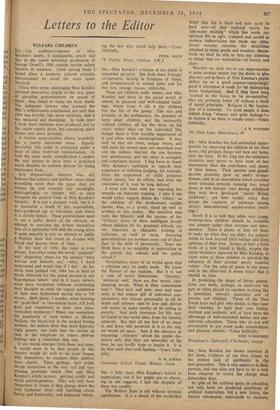WELFARE CHILDREN
Sta,---The audience-response to Miss Kendon's timely, if unpalatable, article and that to the recent television production of George Orwell's 1984 contain certain salient features in common. Chief among these I Would place a tendency (almost certainly subconscious) to avoid the main issues involved.
Those who wrote challenging Miss Kendon
confined themselves largely to the easy game of attacking generalisations on points of detail: they failed to shake the main thesis. The indignant viewers who jammed the BBC's switchboards complained, not only that 1984 was horrific, but, more curiously, that it was immoral and disgusting. In both cases 1 think these reactions were produced, not by the causes openly given, but something much deeper and more personal.
A furious mass-reaction almost invariably has a purely emotional cause. Equally invariably this cause is concealed under a layer of often irrelevant rationalisation. In both the cases under consideration I suspect the real motive to have been a profound social disquiet, an endemic distaste for facing unpleasant facts. Any dispassionate observer who still believes that cultural and spiritual values mean something more than the paper they are . Written on, and certainly any sociologist, anthropologist, or teacher, will at once recognise the general truth of Miss Kendon's remarks. It is not a pleasant truth; but it is as inevitable a result of this materialistic, mass-produced age as television, with which it is closely linked. These protestations seem to me a guilty denial of the obvious, an attempt to convince the writers themselves that all is spiritually well with the young when it quite patently is not; an attempt to justify a Welfare State that crams its citizens with bread and starves them of faith. ing the few who could help them.—Yours faithfully,
PETER GREEN
74 Oakley Street, Chelsea, S.W.3


























 Previous page
Previous page